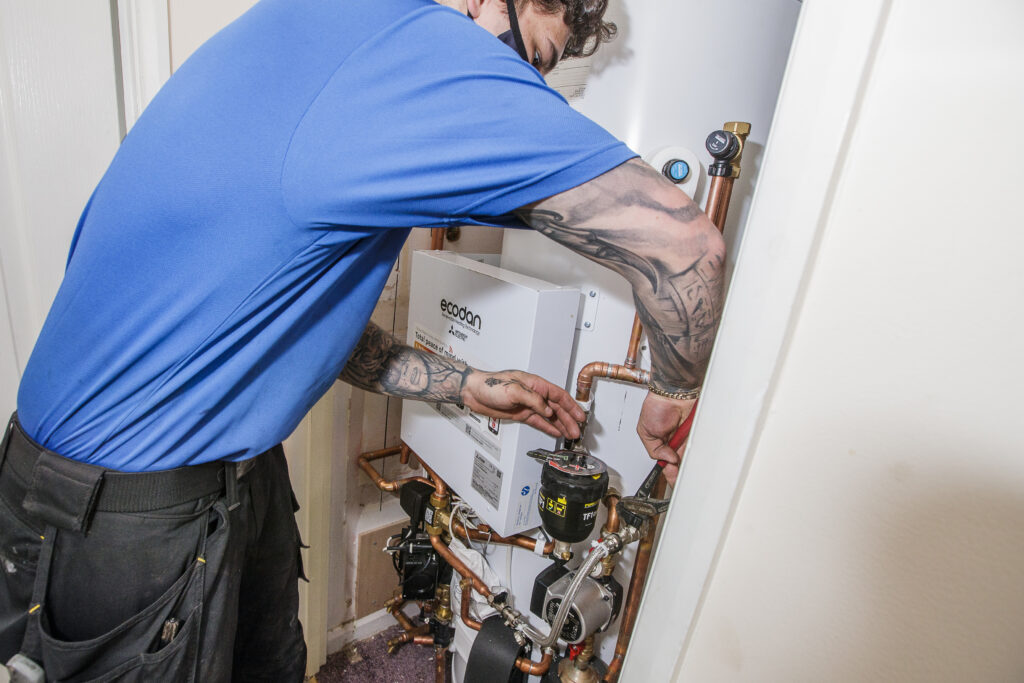Skills shortages in four job roles and three key sector challenges have been identified in a new report from the Energy Systems Catapult.
Funded by the Gatsby Foundation, the report found that the UK education system and wider sector is underprepared for the retrofit revolution, with the home retrofit market needing to decarbonise eight homes a minute for the next 29 years to meet net zero by 2050.
This will require substantial growth and change in the supply chain, the report found.
In the short term, skills gaps that need prioritising include roles in property assessment, advice and customer care, low carbon heating installation and technology integration.
In the medium term, three key challenges must be addressed by the sector to develop the market, stimulate demand and increase capacity and skills provision across the supply chain. These are consumer confidence and trust, quality and governance and integration.
Alongside the skills gap and challenges the report identified, it also found a need for wider activities to address structural issues, including making better use of data to provide more detailed and meaningful property assessments and to highlight performance gaps after installation has taken place.
There is also a need for improved quality assurance and monitoring of installs to drive improvements in installation and training, as well as increasing customer confidence in the supply chain.
There should be a focus on customer care and experience, in particular provision of good-quality advice and information to customers to enable them to make decisions confidently.
Additionally, ways of better integrating a fragmented supply chain should be identified, the report said, increasing knowledge sharing and collaboration to help promote good practice and develop offers that customers will find attractive.
The report also detailed how currently higher education and further education curricula focus almost entirely on new build and fossil fuel burning technologies, with this to the detriment of retrofit and low carbon technologies.
This challenge must be addressed collaboratively, the report said, building on existing best practice, identifying gaps and bringing together different elements of the supply chain to create joined up solutions that will work for customers and businesses alike.
Energy Systems Catapult has now been commissioned by Gatsby Charitable Foundation to continue the work into this issue with the next phase of foresighting, which will focus on working with key stakeholders within the retrofit sector, identifying top priority skills and roles required for the acceleration of retrofit and the exploration of future scenarios to identify solutions to the challenges.
Geraldine Newton-Cross, commercial director at Energy Systems Catapult, said: “Decarbonising our homes is an urgent challenge. If consumers are to welcome changes to their heating systems at the pace required to meet our carbon budget, they need professionals who can hold their hand as they retrofit their homes, not just provide piecemeal recommendations about favoured technologies.”
Last year, in support of the retrofit revolution, the Mayor of London unveiled a new centre of excellence, a partnership to bring together social landlords and building firms and a new investment in the solar workforce called Solar Skills London, which included a placement to get trainees into solar businesses.
Following this, the Mayor also committed £51 million through the Warmer Homes scheme for the rollout of energy efficiency technologies including insulation, ventilation and heat pumps across the capital.
Meanwhile, the government released its Heat and Buildings Strategy last year, announcing it would be offering grants of £5,000 for the installation of heat pumps from April 2022 as part of a new £450 million scheme to upgrade domestic heating infrastructure.






